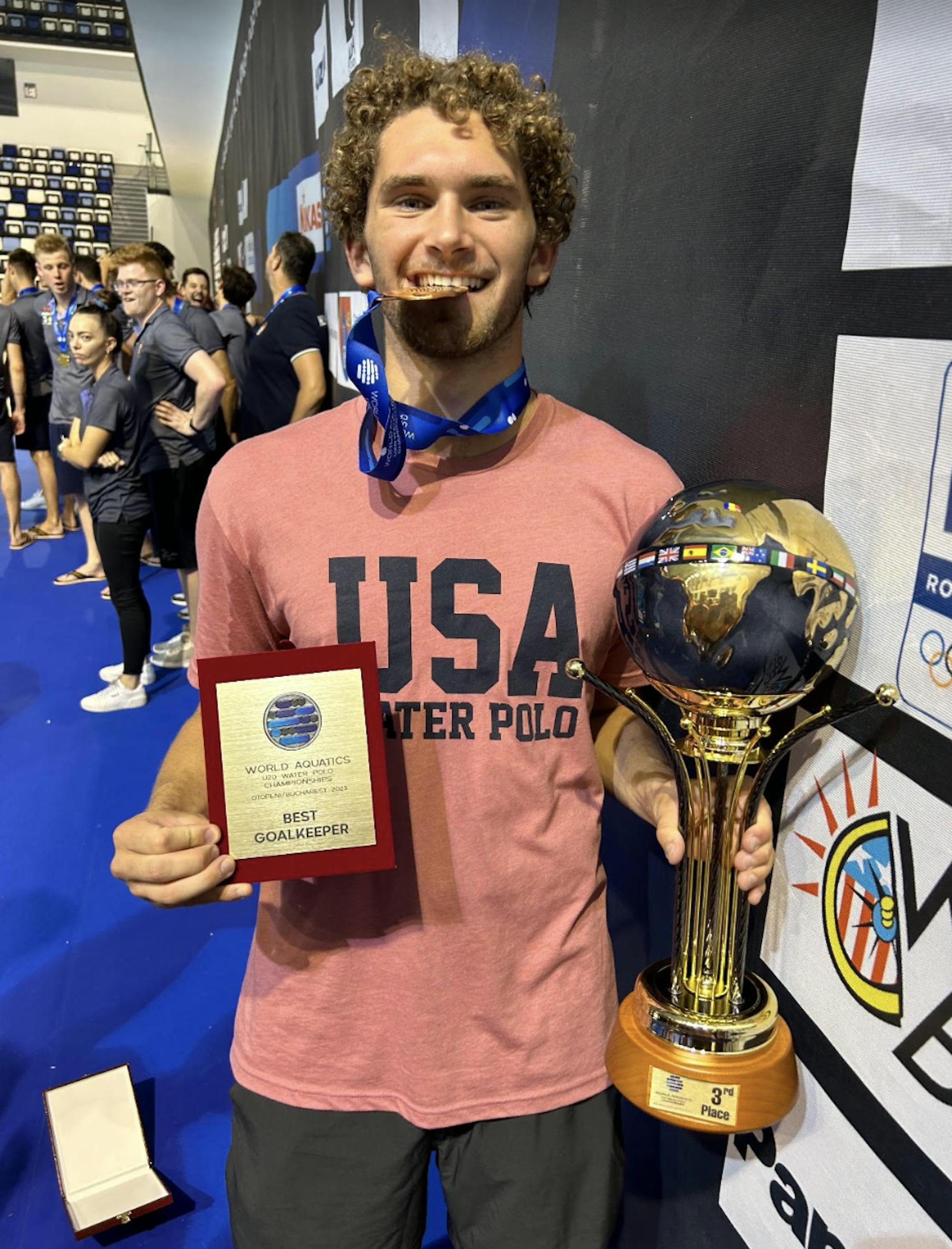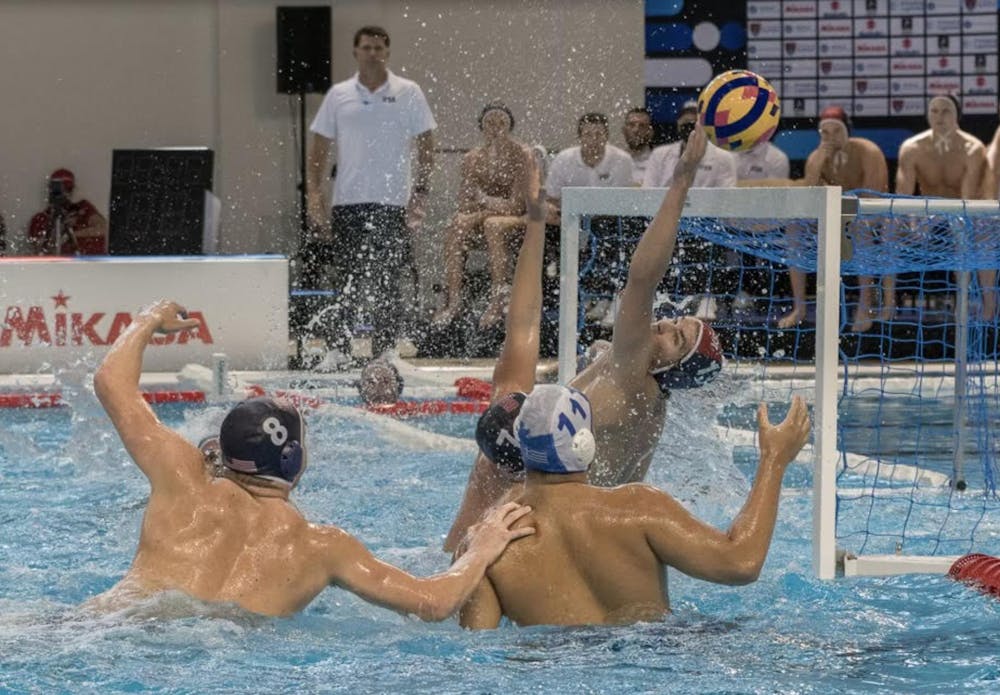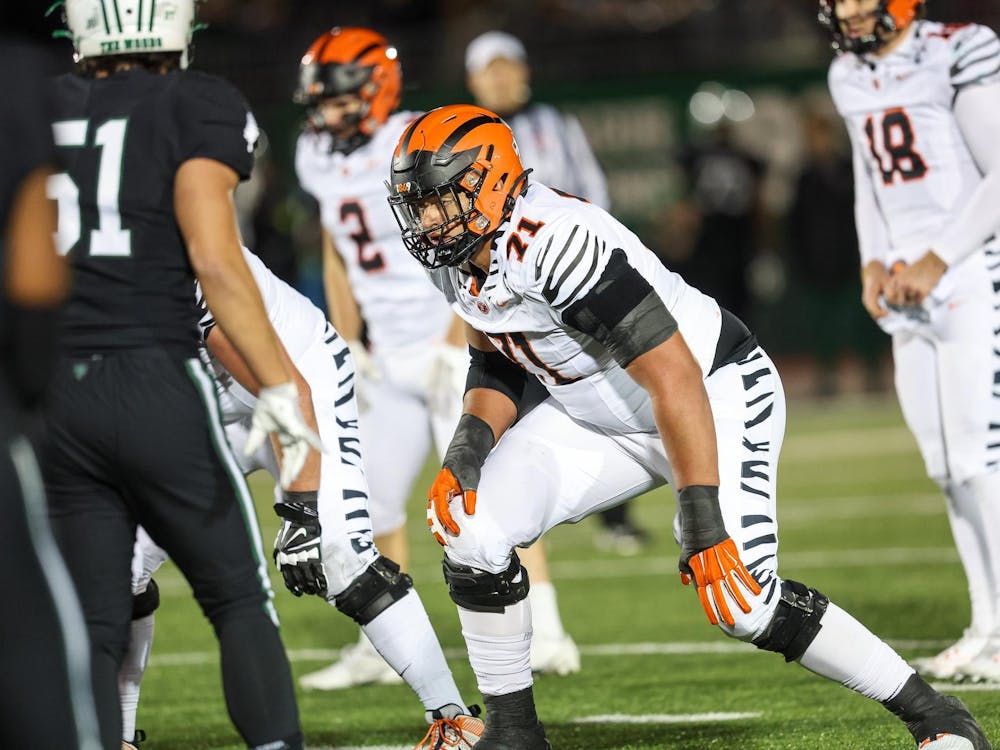It was just another day studying for finals at Firestone Library when then first-year goalie West Temkin got a call from the USA Water Polo Men’s Junior National Team head coach Jack Kocur.
“You made it. You’re on the roster. We’re going to Serbia and Romania, are you in?”
Temkin paused for a moment, realizing that all his hard work from the past six months had paid off before responded to Kocur, “F*** yeah.”
Kocur told Temkin that he was the second goalie selected and would back up Griffin Price — a first-year redshirt at Stanford — and represent Team USA at the 2023 Water Polo Junior World Championship. Fast forward 50 days and Temkin has been named the tournament’s Best Goalkeeper, helping lead the United States to its first-ever medal at the event.
Surprisingly, water polo was not in Temkin’s mind until seventh grade. Due to his height, he enjoyed playing basketball during his younger years. Unfortunately, in sixth grade, Temkin developed Osgood-Schlatter Disease in his knee, a condition that wouldn’t allow Temkin to play land sports.
At the time, his good friend Jackson Painter — a current senior on Stanford water polo — suggested that Temkin start playing water polo. He started playing for his local club team on the “C” team as a field player. Being a goalkeeper had never crossed his mind, but everything changed when one of the main goalies moved up to an older age group.
“They looked for the next tallest guy in the pool and that was me,” Temkin told The Daily Princetonian in an interview. “That day, I became the team’s starting goalie without any experience playing goalie. I worked super hard for the first few years to really understand how to play goalie.”
In August 2018, Temkin started as a freshman at Campolindo High School in Moraga, California. He fully expected to play on the junior varsity team, but was chosen to be the backup goalie on the varsity team. His hard work would pay off once more when he earned the starting spot halfway through the first season.
“We had probably the best team in the nation my freshman year at Campo [Campolindo], and growing up around that talent just made me so much better,” Temkin said. “The group of guys were so special.”
During his freshman year, the team won the CIF-North Coast Section (NCS) championships by double digits. Unfortunately for Temkin, the state championships that year, scheduled in Northern California, were canceled due to bad air quality. At Campolindo, Temkin was surrounded by talent throughout the roster and coached by Miles Price and Anton Sapozhnikov.
“Miles and Anton were just extremely good coaches and always held us to a really high standard, pushing me to be better,” Temkin added. “My teammates served as good role models for me wanting to go play in college and just through my career at Campo. I was able to grow as a player through great coaching and just being surrounded by talent.”
At the end of his freshman year, Temkin became the first high school water polo player ever to receive an All-American nomination as a freshman.


West Temkin in goal as a freshman at Campolindo High School
Courtesy of West Temkin
The Campolindo roster Temkin’s freshman year featured over 10 future Division I water polo players. This included the likes of utility Giorgio Alessandria (UCLA ’24), Beck Jurasius (Stanford ’23), Soren Jensen (Stanford ’24), Marcus Longton (USC ’23), and Jack Larsen (UCLA ’24).
After participating in USA water polo’s Olympic Development Program (ODP), he was selected for the Youth National Team following his impressive first season. Temkin was the only rising sophomore playing with a team that consisted of all rising juniors and seniors. The team won the UANA Youth Pan American Championships in Trinidad and Tobago.
He earned two more All-American honors throughout his high school career, winning two NCS championships. His junior year being canceled prevented him from being the first player to get All-Americans all four years. His best memory at Campolindo was beating Miramonte in the NCS championship game his sophomore year, after losing to them twice before earlier in the season.
Throughout high school, Temkin made it a priority to keep his grades up and keep his options open. Despite being recruited by the University of California-Berkeley — the defending national champions at the time — Temkin ultimately chose the Tigers.
“What it boiled down to was, am I going to play water polo for the rest of my life,” Temkin told the ‘Prince.’ “Or am I going to go to a school where I can meet amazing people and have a fantastic career. I'm 100 percent confident that guys [who] go to Cal [Berkeley] and UCLA and all these UC’S do that as well. But I think Princeton just sets you up for a way better 40 years after college.’”
Last season, Temkin and the Tigers won a program record 27 games and earned a bid to the NCAA tournament. Temkin had a 14–2 record in goal for Princeton, making 154 saves — including 10 against Fordhman in the first round of the NCAA tournament.
He appreciates the fact that while being on the East Coast, he and his teammates still have the opportunity to play the top teams in the nation in California.
According to Temkin, “Dusty [Men’s water polo head coach Dustin Litvak] makes it such a priority for us to travel to California … We’re still competing with them, we just went to California and played an extremely close game with UCLA and Pepperdine — closer than most people have played UCLA.”
“I think it’s extremely impressive what we’re able to do being this far away. And I think adjusting to that has been a lot easier than people assume coming in,” he continued.
In mid-October, the men’s team traveled to California to play seven games in a week, including the No.1 ranked UCLA Bruins, who they lost to by just two goals. For reference, the Bruins have played the Berkeley Cal Golden Bears three times this season, going 3–0 and beating the defending national champions by an average of three goals.
Temkin explained how the team embraced being from the East Coast even though many of the players have Californian roots. Last season, the team adopted the title: Garden State Warriors.
“A lot of the guys from the team are from the Bay Area, home to the Golden State Warriors. One day, we realized we're in the Garden State,” Temkin said.
“It’s always a surprise to people that we’re able to do so much from New Jersey in a water polo aspect. Who would have ever thought that a team from New Jersey would be ranked sixth [in the country]. We’re the only collegiate water polo team in the entire state. Being able to do so much here … it’s our state and we’re defending it.”
Throughout his career, Temkin has been surrounded by other stellar players. Last season as a first-year, he split time in goal with Antonio Knez, who is currently at Pepperdine University using his final year of NCAA eligibility. This season, Temkin is again splitting games with Kristóf Kovács — a first-year from Hungary.
On the USA junior team, Temkin and Price went head to head for the starting spot. “Competition is amazing, but it's also extremely hard,” Temkin said.
“What makes it so unique is my connections with Knez last year, Kovacs this year, and Price, we’re all extremely close and good friends, so the competition is friendly. But … there’s always that aspect of well, one person is going to play. So it always makes me work even harder,” he continued.
His junior national team experience started in January 2023, following the conclusion of his first season with the Tigers. A rigorous training camp began with 60 of the best American water polo athletes under 20 years of age. There were eight goalies at the training camp fighting for two spots, and Temkin was determined to be selected for the team.
“I actually hurt my knee and wasn't able to play for half of the first training camp,” Temkin told the ‘Prince.’
“I came back [to Princeton] and was like, I need to get healthy. I did a ton of physical therapy. On top of the extra work I was doing in the pool, I would go to the women’s practices on top of our [men’s team] practices, and then also spent hours doing stretches and PT [physical therapy] in the training room.”
Every month after the initial training camp, Temkin would leave Princeton to fly to California, just to be back on campus for 72 hours, training and playing scrimmages for the entire weekend. Each month, more players would be cut with the final roster eventually consisting of two goalies and 13 field players.
The final training camp was in late April, during the weekend of Princeton’s lawnparties. “I’ve still never been to a lawnparties,” Temkin said, laughing.
During that weekend, there were three goalies left: Temkin, Price, and Bernardo Herzer (a redshirt first-year at USC). Ten days after returning to Princeton, Temkin would get the call from Kocur while studying for finals.
The 15 athletes trained before heading to Europe at the USC for three days. Temkin was told that Price would not be there for the first two days, leaving him as the sole goalie.
“I was told that I’d be the only goalie there for the first two days so I was like, I have some time to showcase myself. I can really, like, show my potential,” Temkin said.
He added, “I played extremely well and was off to a great start. I told myself, look, you’re the second goalie. There’s no pressure right now to like, beat him out. I don’t know if these coaches have their minds made up, but I’m just gonna play like I play.”
Prior to the tournament starting in Romania, the team headed to Serbia to train for a week and played a warm up tournament without any implications to prepare for Junior Worlds. Price would start the first exhibition game against Hungary, but Temkin would get the nod for the next three games.
“He puts me in Serbia and then puts me in Montenegro and then the Croatia game, and we win Montenegro, and we win Croatia, and you start winning these games that I’m playing, and I’m like, wow,” he said.
Prior to the tournament, Temkin suffered from a quad cramp and was in severe pain. “I could hardly walk. I spent like two hours a day getting this like, worked on by the trainer, I could just barely make it through these games. But, I wasn’t telling anybody, I was just hanging on by a thread,” Temkin said.
Everything changed when the team got to Romania. Before the first group game against Greece on June 11, Temkin was told by the coaching staff to meet them in the lobby.
“You’re on man. You proved this past week that you can do it … We had a stat coach there also just strictly took stats for us. He just said, ‘We looked at all the stats … like it’s conclusive that you have to be the guy playing,’” his coaches told him in the lobby, according to Temkin.
Temkin said he knew that his performances would have to back up the decision made by the coaching staff.
“I was excitedly nervous, nothing has started yet. The pre-tournament meant nothing.” The team played at an Olympic level pool, with box seats for select fans.
He added, “In the past, I wasn’t super proud of how I’ve played internationally. And I wanted this to be the big change. I wanted to feel good about how I played, so I didn’t let myself get super worked up. But it felt amazing.”
Once the tournament started, Temkin took advantage of the opportunity. He made eight saves against Greece in the opening game en route to a 13–10 win for Team USA. He continued to impress throughout the tournament, and never lost his starting spot.
Against Montenegro in the quarterfinals — a game in which many expected Team USA to be knocked out — Temkin had one of his best games, recording 12 saves and putting Team USA in the semifinals. After losing in the semifinals to Hungary, the team had a rematch with Greece. This time, for a chance at a medal.
Temkin let in just six goals, garnering 12 saves en route to a dominant 11–6 win. The win marked the first time Team USA medaled at a junior world championships tournament.

Temkin poses with his bronze medal, the third place trophy, and his best goal keeper award at the 2023 Water Polo Junior World Championships award ceremony.
Courtesy of West Temkin
“I think that might have been one of my best games, I didn’t really have any errors. And as a whole, like, our group played so extremely well. I give a lot of credit to my teammates and the effort they put in. None of this would’ve been possible without their support,” Temkin said.
Temkin added, “I remember waiting next to Serbia and Hungary, two of the best countries historically. After them, it is usually Montenegro, Italy, Spain, but it was us, the US.”
Someone went up to Temkin, telling him he was being presented with the best goalkeeper award. Temkin was unsure whether or not to call his mom, but chose to have her be surprised during the ceremony. Temkin’s parents went to Romania to support him despite being unsure if he was going to be playing at all.
“I come from around the corner. I can see my mom and everyone is so surprised,” Temkin told the ‘Prince.’
“I went to go hug my mom later and she was crying,” Temkin said. “The support that they’ve [his parents] given me throughout the years and my sisters, my family has just been, like, my number one fans.”
At Princeton, Temkin is planning to major in the School of Public and International Affairs (SPIA). He is unsure whether or not he will continue his water polo career after Princeton, but wants to stay connected to the sport he has come to love.
“It really just depends on what the senior national team needs, like what the goalie situation is,” Temkin said.
“I would love to play with them for a few years. I would also love to go play in Europe for two, three years. I do want to keep playing water polo for the rest of my life, whether that be with an Olympic club, or coaching,” he continued.
The Tigers are in the midst of yet another historic season. With a record of 25–5, the Tigers are just two wins away from a third consecutive NCAA berth.
“You can always think that you’re the underdog and try to embody that underdog mentality. But we’re not the underdog anymore,” Temkin said.
He said, “We’ve shown time and time again that we have the talent to compete with these teams. I’m fully confident in our group of guys that we can win a national championship.”
Hayk Yengibaryan is an associate editor for the Sports section at the ‘Prince.’
Please send corrections to corrections[at]dailyprincetonian.com.








